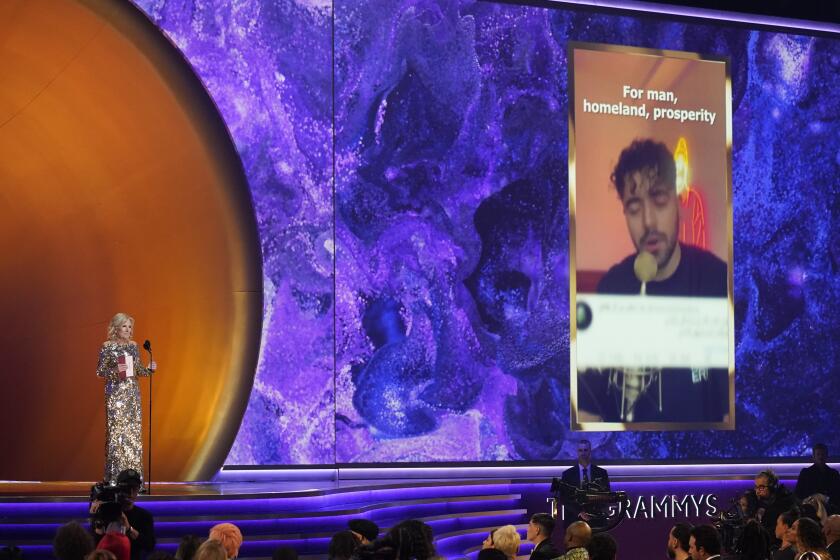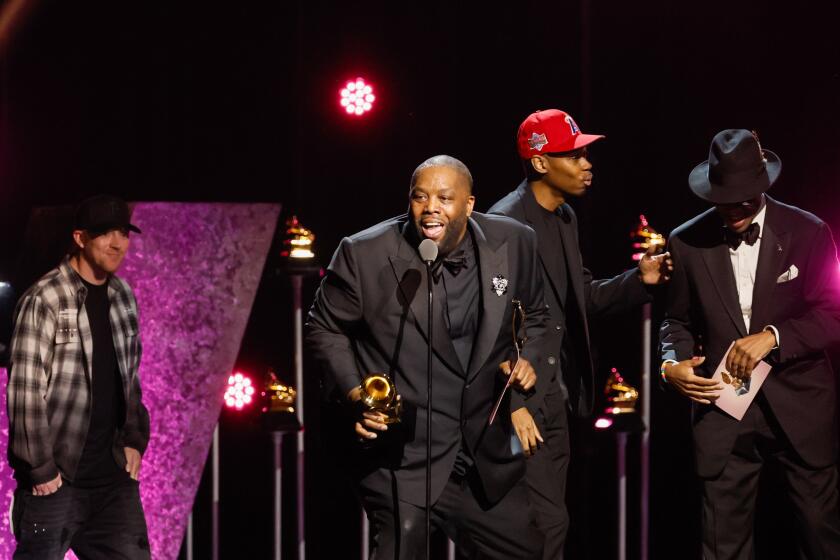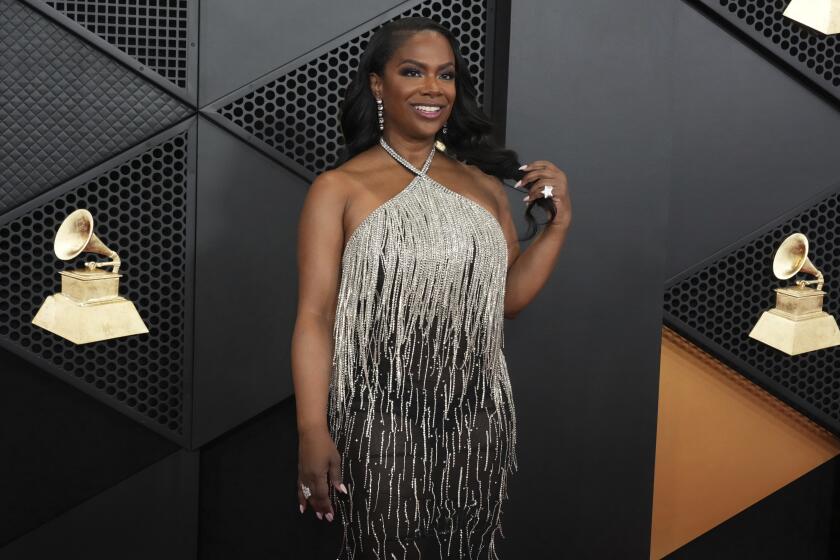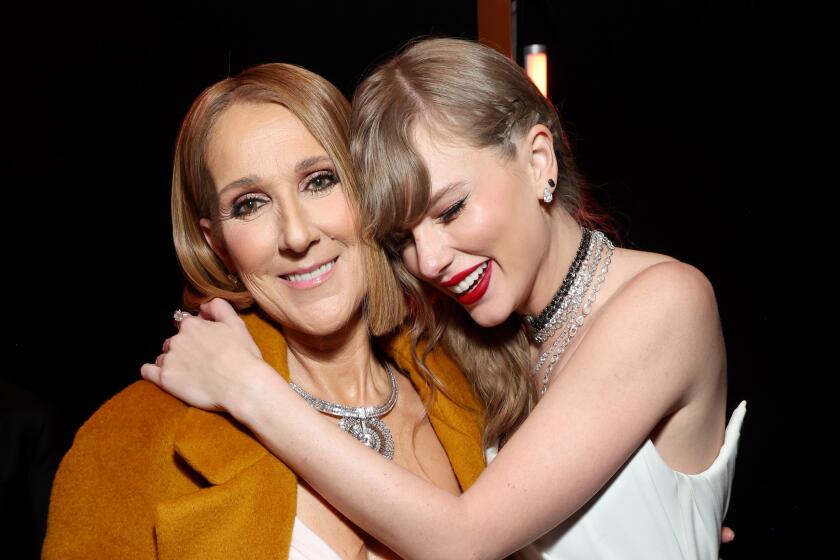Grammy Voting Can Be Had for a Song -- Actually Six
Ever since Warner Bros. Records rounded up more than 100 employees to spend a hot summer day crooning Christmas carols, rivals have been buzzing about an alleged conspiracy to deck the company’s halls with Grammy Awards by qualifying scores of insiders to vote for the coveted music prizes.
Warner’s carolers insist they’re just singing for charity -- and the National Academy of Recording Arts & Sciences says label employees trying to crack the voter ranks will have to do more than warble about a partridge in a pear tree.
Still, some suspect that the recording session was just the latest example of a tactic used by record labels to boost their chances of snaring a Grammy. In the last few years, employees of Universal Records and Zomba Music have recorded holiday albums of their own.
“This has been a thorn in the side of the organization” for some time, said industry veteran Joe Smith, a former president of the Capitol and Warner Bros. labels who served as the academy’s first full-time president in the late 1980s. “It is easy to manipulate voting by enrolling members of the academy who have no business being in it.”
Success at the Grammys has become a bigger priority for many music executives over the years.
A big win on the national telecast can mean enormous leaps on the pop chart, even in a slumping market. Sales of Norah Jones’ album “Come Away With Me,” for example, surged more than 300% the week after she won several Grammy statues in February. Sales remain strong six months later.
Critics of the annual music telecast have long ridiculed the program’s credibility, saying Grammy voters have appeared to favor mainstream bestsellers over true artistic breakthroughs. But until now, few had suggested that record labels themselves might be stuffing the ballot box for financial gain.
Under the rules of the Santa Monica-based academy, any member who has technical or creative credit on six commercially released songs -- from vocalists to liner note writers -- can be eligible to cast his or her ballot in the competition. There are about 14,000 voting members of the recording academy. Smaller categories, such as for best polka album, are typically decided by a few thousand votes.
In the case of Universal -- where employees recorded a collection of tunes under the name Universal/Motown All-Stars -- executives are unabashed about their efforts to sign up more Grammy voters from within the corporation’s ranks.
Universal President Monte Lipman estimated that of the 100 or so staff members who chose to sing on his employee album, about 50 ultimately registered to cast ballots. He likened the labels’ efforts to a political party’s move to bus voters to the polls.
Asked whether employees are likely to vote for their labels’ own artists, Lipman responded: “That’s like asking Bill Clinton or any other politician whether they voted for themselves.”
At the same time, Lipman suggested that it was entirely appropriate to have label staffers sing in order to vote. For one thing, he said, it helps marketing and promotion employees and others in the corporation better understand the process of cutting a record. Besides, he added, “people that work at a record company are creative,” no matter which department they’re in.
“I found it to be a very, very positive and rewarding experience,” Lipman said, “and I encourage all in the industry to do this and exercise their right to vote.”
As for Warner Bros., staff members recorded about a dozen holiday songs for a planned commercial album during a session in Burbank several weeks ago, sources said. The recording, made under the supervision of a choral director, was then sent to the AOL Time Warner Inc.-owned label’s New York and Nashville offices so that additional employees could add their vocals, according to people familiar with the plan.
The unusual in-house production -- and the potential for other labels to make such recordings and distort Grammy voting -- has been the subject of industry chatter for weeks.
“I’m not going to comment on this particular situation, but I’m very busy putting together the Firm Choir,” joked Simon Renshaw of artist management powerhouse the Firm, which represents such acts as the Dixie Chicks and Mary J. Blige.
Warner Bros. declined to comment.
A source close to the company maintained that the album was conceived only to raise funds for a New York charity, and follows other philanthropic projects by the label. These included the post-Sept. 11 donation of earnings from a single by singer Enya and a tribute concert DVD.
Warner Bros. hasn’t tried to prod employees to apply for Grammy organization membership since the recording session, the source added.
Nonetheless, word of the recording has renewed concerns that music’s biggest night is open to being tainted.
“You can still pull things,” said Smith, the former Grammy chief, who characterized the Warner recording as “very suspicious.”
“It’s not very difficult to manipulate the vote in certain categories,” he said.
Insiders now are raising questions about the rationale for “Miracle on West 25th Street,” an album released in September by Zomba Music Group, home to such acts as Britney Spears and R. Kelly. The album, performed by the label’s staff and credited to the “Zomba Choir,” contains six songs, including “Jingle Bells” and “The Dreidel Song.”
A spokeswoman for New York-based Zomba dismissed the suggestion that the label was seeking Grammy voters, saying the album was created because “we would do something fun to lift people’s spirits” as the company struggled through its corporate acquisition by media giant Bertelsmann.
The spokeswoman said Zomba commercially released the recording “so we could see it all the way through.” The album has sold 34 copies, according to Nielsen SoundScan data. She said she didn’t know whether participants on the album applied for Grammy voting status.
Universal and Zomba each released their employee albums on or just before Oct. 1 -- the academy’s deadline for recordings being claimed as credit by would-be voters. Most major labels don’t begin selling most of their Christmas music until weeks later.
Grammy chief Neil Portnow, named to lead the academy last year, said he believed the organization’s screening of potential new voters was “pretty thorough.” Portnow also expressed confidence in the academy staff and accounting firm Deloitte & Touche, which oversees tabulation of the formal voting process.
But he acknowledged that there were “loopholes in probably any process.”
Portnow, who spent 14 years at Zomba and served as the label’s senior West Coast executive at the time its “Miracle” album was released, said he didn’t know whether the recording was intended to bolster the company’s Grammy votes. Portnow said he was “aware that there was discussion about taking everybody into the studio,” but added that he didn’t know the purpose of such a visit.
Even though existing rules apparently make it easy for any label employee to gain credits toward voting rights, Portnow said the academy had the ultimate right to decide whether an applicant qualified for membership or voting privileges, recording credits notwithstanding. He made it clear that Warner Bros.’ singing staff would have a difficult time making the cut.
“The reality of this situation is these are not people who make their living primarily as singers or musicians,” Portnow said. “Certainly, if we ever were to see a dramatic increase in traffic coming from one source, it would raise our antennae.”
In fact, Portnow said, the academy within the last few years rejected Grammy voting applications from certain music employees who had made a recording because they were “otherwise unqualified.” He declined to identify their employer.
Given the latest uproar about Warner, Portnow said he was determined to be extra vigilant.
“This is clearly on the radar ... going forward,” he said. “We like to have a level playing field for all artists and all nominees. We’re not going to tolerate anything other than the highest standards -- the straight and narrow, no exceptions.”
More to Read
The biggest entertainment stories
Get our big stories about Hollywood, film, television, music, arts, culture and more right in your inbox as soon as they publish.
You may occasionally receive promotional content from the Los Angeles Times.






